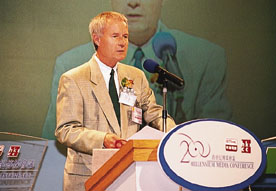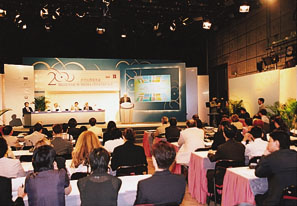Two sessions were held in the "Millennium Media Conference". The respective discussion topics were: "Roles and Modes of Public Broadcasting Services in the 21st Century" , and "Public TV and Creativity". Professor Hansjurgen Rosenbauer, Managing Director of a public broadcasting service in Germany (Ostdeutscher Rundfunk Brandenburg) gave a keynote address on how the development of new technology and media environment has brought new challenges to European public broadcasters. Following is an extract of his presentation at the Conference.
 Prof. Hansjurgen Rosenbauer, Managing Director of ORB/ Germany, was invited as the keynote speaker at the Conference. |
If you expect things to get easier in the next century:forget it ! It's going to become more complicated and even more competitive. New challenges galore for public broadcasters everywhere in the world. It will not be enough to offer good radio and exciting television programs. They have to be accompanied by internet services and become a part of the cross-media-market: radio, television, home-computer, internet. Executives and producers will have to think three-dimensional. Multimedia will become one media. If you want to survive, it is not going to be enough to make a stand-alone offer.
All this, as you well know, is due to the so called "Digital Revolution" within which interactive multimedia/on-line broadcasting is already becoming a most promising global market segment for the broadcasting industry. But we must also be aware that along with all these challenging multimedia promises, uncertainties are still remaining.
New Relationships
In Europe, public broadcasting as the major content provider needs to adopt, install and test respective digital technology (which is still not fully reliable as we all experience every day). Public broadcasting has to experiment further with new forms of interactive multimedia content. It has to assess audience reactions to this kind of programming.
Our organizational structures and human resources need to be reorganized and developed. In order to meet the competition from large alliances in the global communications industry, a new relationship between creative and technical staff as well as between "users" and providers must be introduced. To make the complex shift towards full swing digital broadcasting possible, substantial support is required and has to be secured. As public broadcasters, we are more than ever dependent on the further commitment by the public in order to create new and compelling material, to evaluate technological possibilities, and to be capable of reacting quickly to new opportunities.
All this is going to cost money, and for a transition period we will spend a lot merely to get our signals from the stations to the people: analogous, digital, via cable and satellite. I don't want to bore you with technical details, you are probably all too familiar with them. But we can be assured that at least for a few years after the complete transition to digital broadcasting, we will get rid of all that simulcasting.
Service to the Public
Let's talk about content, about programs, about the services we have to offer to our communities. It will - at least in my country - become more and more difficult to justify a public system that is comfortably financed by fees and provides a rather wide variety of TV and radio channels: two nationwide and competing full service TV networks, four nationwide special-interest channels, eight regional TV channels and about sixty radio stations, most of them via satellite available all over Germany and parts of Europe. Public TV in Germany has an average market share of 40%, public radio of more than 50%. In addition to this, we offer a digital-bouquet that uses existing programs as the basis for redesigning them as separate services.
Our commercial competitors are of course appalled, and would like to limit us to those programs that are expensive and do not reach larger audiences. So far, the supreme court has upheld the necessity of a public system as a precondition for the existence of the private sector. Public radio and television at least in my understanding, is part of our national heritage. It has to provide its audiences with basic information, education, entertainment. It has to present programs for majorities and minorities, and it has to guarantee a basic quality.
It has to reflect regional identities, it has to deal with the problems of its viewers. Public television has to reach audiences that commercial television is not even interested in. Those audiences are, naturally, those that don't translate directly into commercial profit. No matter how global the big players go: they cannot beat us in this field: regional and local, concerned and honest, independent and critical.
Of course, we need the money and the opportunities to attract larger audiences with major sports events, TV-movies and prime-time shows. We should seek possibilities for coproductions and sponsoring. Most of all, we should maximize the potential of innovative and successful ideas of other public stations.
We should not bore people to death, we should not allow semi-professionalism. We must give space and means of production for new ideas, for experiments, for off-beat-shows that may become main-stream. But most of all: people have to trust us. They have to believe us. They have to believe that we are there for them, and that the only reason for our existence is service to the public and not service to the shareholder.
Future Challenges
We have to be aware of the dangers that lie in the increasing numbers of Pay-TV channels. More and more of our air space is being privatized, more and more we are supposed to regard the media as something that does not belong to the society as a whole, but is part of a market economy. Complete deregulation could mean that permission to provide audiences with TV, radio and online-programs does not have to be given anymore, but is taken for granted.
 Millennium Media Conference focused on how public broadcasters face a tidal wave of radical changes in the new century. |
Free-TV, not only commercial but first of all public free-TV, has to guarantee access to information, service and entertainment. It has to set standards. It has to make sure that the division into information-rich and information-poor does not harm society as a whole. Freedom of information does not mean the freedom to make money. The necessity to finance commercial media, to make a profit can lead to the contrary of TV and radio as part of the process of democracy. It can reduce the audience to mere consumers of yellow-press-journalism and of trash-programming.
Be assured that it will not be easy to convince politicians that they have to give us the means to really compete in all areas: those that we are used to and the new ones that are just developing. We need the public, we need the voice of the voters and we need convincing programs. It is our real challenge for the first years of the new millennium to make clear once again that public broadcasting as a public forum for communication, for the exchange of ideas, is essential for the functioning of a democracy. We have to make clear that new technologies should not be allowed to reduce our chances to reach a wide and diversified audience.
Public broadcasting is a mass media, but it is nevertheless working in the public interest, it is working for the common good.


